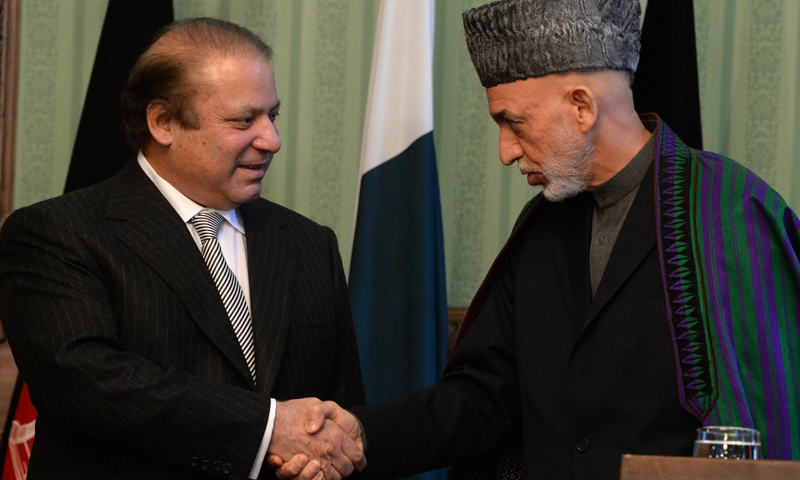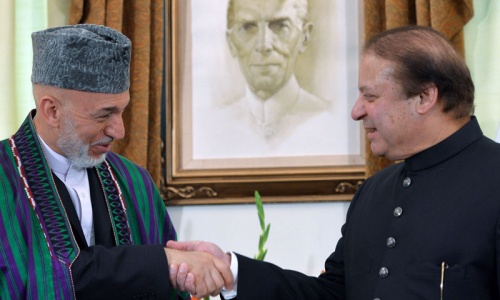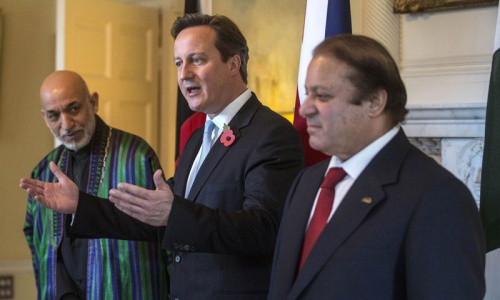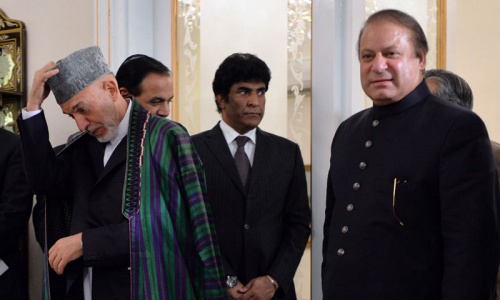KABUL: Prime Minister Nawaz Sharif reiterated on Saturday that achieving peace and stability in Afghanistan is in Pakistan's interests.
The Pakistani prime minister was speaking at a joint press conference alongside Afghan president Hamid Karzai during his one-day visit as part of efforts to revive Afghanistan's peace process before Nato troops withdraw next year.
The one-day visit is the premier's first since he took office in May and comes as Karzai is locked in a public dispute with Washington over a crucial security deal covering the role of US soldiers who remain in Afghanistan after 2014.
Sharif reiterated that Islamabad desires friendly and good neighbourly relations with Afghanistan based on mutual trust‚ respect for sovereignty and territorial integrity.
He said that the recent release of a senior Taliban leader Mullah Abdul Ghani Baradar shows that Pakistan is committed to helping bring peace to Afghanistan.
The premier said that an agreement had been reached with President Karzai for a mechanism to allow members of an Afghan peace council to continue talks with Mullah Baradar, who was released from Pakistani detention last September. He did not provide details.
“A few days ago Salahuddin Rabbani, the head of the peace council, visited Pakistan so we once again discussed the peace process,” Karzai said after meeting Sharif. “We discussed how Afghanistan, Pakistan and the United States can work together to bring peace to the region.”
Pakistan is seen as crucial to peace in neighbouring Afghanistan as it was a key backer of the 1996-2001 Taliban regime in Kabul.
During his visit, Sharif will also meet the Afghan High Peace Council, which is seeking to open negotiations with the Afghan Taliban insurgents who have fought US-led Nato and Afghan forces since 2001.
When asked by a reporter about allowing US troops to stay in Afghanistan, Sharif replied that Afghanistan is a sovereign state and that it would have to take a decision on its own. We stand by Afghanistan and will continue to do so in the future, he said.
Sharif also said the two leaders discussed trade and energy issues.
The topics under discussion included a plan to expand an electricity distribution network, called the CASA-1000, to ship surplus power from the Central Asian states of Kyrgyzstan and Tajikistan through Afghanistan and into Pakistan, which suffers massive power shortages that threaten its industrial production and economy.
Sharif also said he discussed the TAPI project – a planned natural gas pipeline from Turkmenistan that will pass through Afghanistan to Pakistan and end up in India – during his meeting with the Afghan president.
Afghanistan's peace process has been at a standstill since a Taliban office opened in Qatar in June, enraging Karzai as it was styled as an embassy for a government-in-exile.
The Taliban have refused to have direct contact with Karzai or with the High Peace Council, dismissing them as puppets of Washington.
Karzai and Sharif met British Prime Minister David Cameron in London in October in the fourth of a series of trilateral meetings designed to foster stability in the volatile South Asia region.
The Afghan president, who is due to step down next year, has been stalling over the security pact with the United States that would allow some US troops to stay in Afghanistan for training and counter-terror missions after the Nato combat mission ends.
Washington is keen to complete the deal, but accuses Karzai of introducing new, last-minute conditions despite a “loya jirga” assembly that he convened voting for him to sign the agreement promptly.
The Afghan president has been bitterly critical of the United States, and on Friday rounded on Nato forces over an air strike that he said killed a two-year-old boy in the southern province of Helmand. “This attack shows American forces are not respecting Afghan lives,” Karzai said.
Nato apologised for the civilian casualties caused by the air strike, which it said targeted a Taliban commander involved in operations against Afghan security forces in Helmand.














































